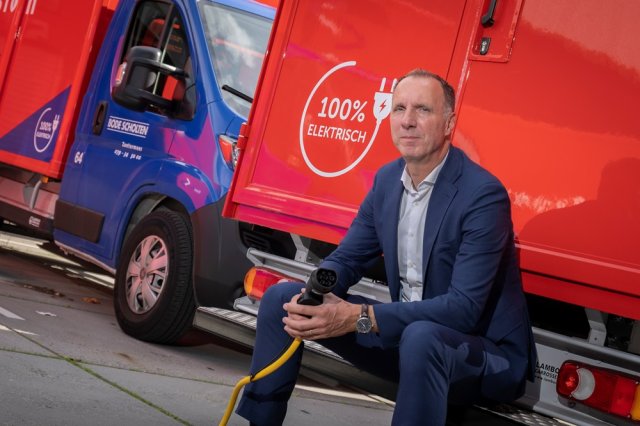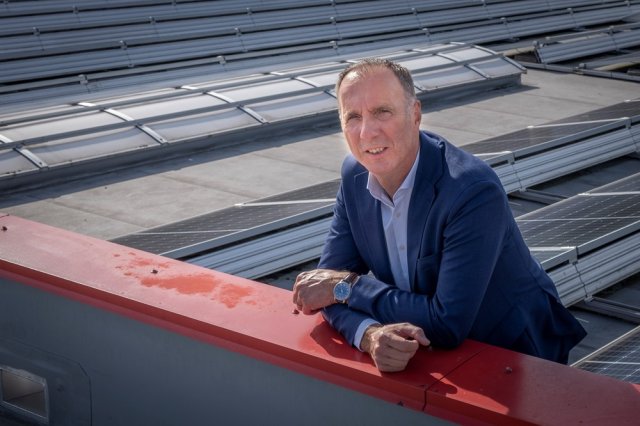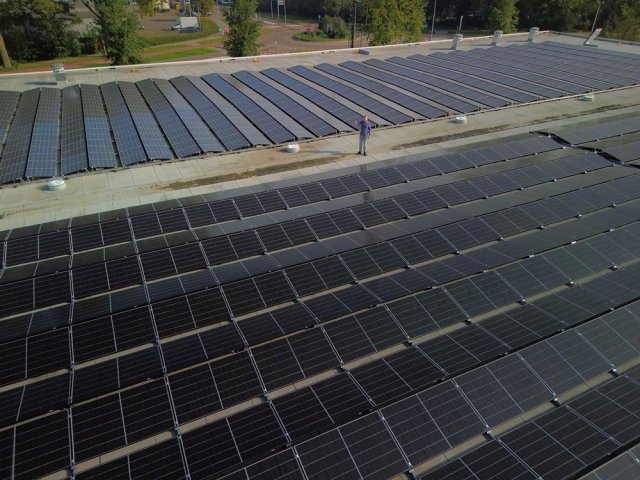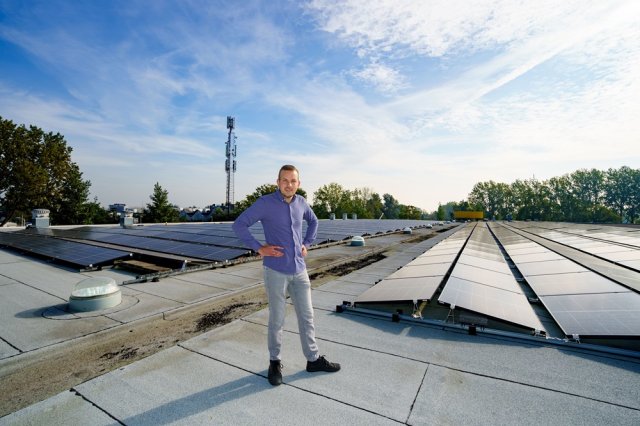Interviews about sustainable business
Bode Scholten takes responsibility in energy transition
Marco Scholten explains choice of solar panels
Marco Scholten, owner of Bode Scholten, believes that as a business owner you have an obligation to save. Personally, Scholten feels a responsibility to the new generations. "Be conscious and frugal. What could be better that we are now able to generate energy from inexhaustible sources sun and wind." Scholten is therefore happy to take responsibility by participating in the energy transition. He has large roofs and would like to fill them with solar panels to play his part in generating clean energy.
Switch to electric transportation
The urge to contribute to the energy transition started years ago at Bode Scholten. Currently, the company is making the switch to electric transportation. There are already 2 electric vans on the road, and later on 4 more will be added, bringing the company to a total of 6 electric vans. Later this year, the first all-electric question car will also arrive. All vehicles can be charged with the current capacity of solar panels. The next 2 electric trucks are expected to be delivered in 2025. From then on, the question is whether the current capacity will be sufficient to charge all electric vehicles.

Increase requested
"We have already applied to Stedin for an increase in our connection for 1,500 Kilowatts. The next step is to equip our premises with charging stations, but in phases, because towards 2030 the expectation is that we will have 10-15 electric trucks and 18-20 electric delivery vans." There are no customers yet who make electric transport a requirement, however, "The CSRD guidelines take effect as of 2025 and a number of our relations have to report their Scope 3 CO2 emissions."
Roof space enough
Marco Scholten is the grandson of Grandpa Scholten, the messenger of Zoetermeer. "After almost 100 years, we are still doing the same thing. We have now grown to 160 employees, with 3 locations at business park Hoornerhage. In 2019, we built a new building across the street, Fokkerstraat 58. The roof there is now full of 550 solar panels. On the roof of the main building there are 650, which is about half of the roof. So in total there are about 1200 solar panels on the roofs. Partly financed by the SDE subsidy."
Long-term investment
The decision to put down more solar panels than was needed based on their own consumption is a conscious decision based on social responsibility and sustainable business. "I asked myself the question, what can I do? I have a large roof and this can be filled with solar panels to help with the energy transition. The investment in 2019 paid for itself faster because of the high energy costs at the time. In fact, I want to fill all the roofs completely with panels, but with the drop in energy prices, the much lower feed-in fee, the ROI has become a lot longer. We are now more likely to invest in stationary batteries to use the energy generated in the evenings to charge our trucks."
Tips on the process of purchasing solar panels
"Always request 2 or 3 quotes," Scholten responds directly. "With me, local entrepreneurs or those from the region are always preferred. Put these quotes side by side and make a choice based on feeling, price and possibly experience of acquaintances. The price and the feeling should both be good." If possible, have the quotes checked by someone knowledgeable. Solar panels are always expressed in wattage peak. There are panels with different wattage peaks. This makes it very easy to calculate how many solar panels someone needs. "As an entrepreneur, check carefully about the roof construction and the maximum load in kg. Older buildings are not just suitable for solar panels."

Looking to the future
Over the next few years, Scholten plans to focus on building a charging plaza. "The charging plaza is mainly for evening and night. I hope for developments that will allow evening and night to use more than the maximum capacity since it will not be used by the neighbors anyway. That would be the only solution for Bode Scholten." According to Scholten, with grid congestion, it is crucial that we start properly distributing the consumption of the power generated over the 24 hours in a day so that peaks are less high. He expects that energy will never become more expensive because of increasing generated energy from sun and wind and that towards the future there will be a huge surplus of renewable energy available from sun and wind. This in turn could have a positive impact on the development of batteries to store power, and the affordability of hydrogen.
Bouwhof: an inspiring example of sustainable entrepreneurship
Jan Bart Huurman shares his experiences with solar energy
At a time when energy costs are unpredictable and sustainability is becoming increasingly important, Bouwhof chose to install solar panels on its roof. Jan Bart Huurman, the driving force behind this move, shares his insights and experiences to inspire other entrepreneurs to take the same green path.
The driving force: energy conservation and independence
Energy conservation was at the forefront of Jan Bart Huurman's decision. "Our energy costs were extremely high. In January 2023, we were paying more than €20,000 per month. If the costs stay that high, you have to do something. In the worst case scenario, you'd have to cut staff. By installing solar panels, we can save and are less dependent on the energy market. Besides, it gives a good image to the outside," he explains. "Unfortunately, customers cannot see from the outside that there are so many solar panels on the roof. That's why we show the solar panels on several screens in the store, so visitors are aware."
Big roof, big impact
Bouwhof's company roof, covering 10,000 square meters, provided an ideal location for solar panels. "We installed a total of 950 solar panels, in 2 phases: first 400 in 2021 and then another 550 in 2023," Huurman proudly explains.

Challenges and solutions
However, the process also had challenges. "The load-bearing capacity of the roof turned out not to be optimal. We first had to insulate the roof and add a special covering. That came on top of the cost of the solar panels themselves," Huurman says. Despite this, he did not get discouraged and found solutions to make the installation successful.
Visible benefits
The benefits of solar energy are already evident. "In the sunny months of April and May, we delivered back more energy than we consumed based on the calculation. The solar panels generate 300,000 kWh per year, enough for 125 households on an annual basis. We are now generating 50% of our own energy per year," Huurman said.
Practical tips for fellow entrepreneurs
"Be prepared for external factors beyond your control. You don't know what could come next, through wars, for example. With solar panels you are not dependent on an energy party. If, for example, the gas tap is turned off, Bouwhof is not yet in trouble." Huurman himself has not used subsidies, partly due to ignorance at the beginning. "My advice is to learn about subsidies such as the SDE++ subsidy, check when application desks are open and make use of them. The SDE counter is only open on 2 dates a year. I didn't want to wait that long. Invest in things that will pay you back within 5 years, such as LED lighting. Also remember that insurance costs go up when you have solar panels."
Future plans: charging stations
Bouwhof is also looking ahead to further sustainability efforts. "We want to install a good number of charging stations on our property and are looking for companies willing to invest in this," he says. This is not only a sustainable investment, but also a necessary step toward complete electrification of the company's operations. Huurman sees a win-win situation here: "With such an investment, for example, you yourself receive 10% of the proceeds for charging stations. A fast charging station would otherwise cost you between €75,000 and €100,000 each."
Towards an energy-independent business
Huurman's ultimate goal is to make Bouwhof completely self-sufficient by 2028. This means the company will no longer depend on outside energy providers. "We want to become energy independent, but that brings challenges," he acknowledges. The biggest challenge lies in storing large amounts of energy. "There is now mostly talk about batteries, but a large battery that can store all the energy costs about €500,000. And there is also no possibility of leasing," he explains. So far, no company has laid down a good plan for large-scale energy storage, which indicates how innovative and progressive Bouwhof's ambitions are.


